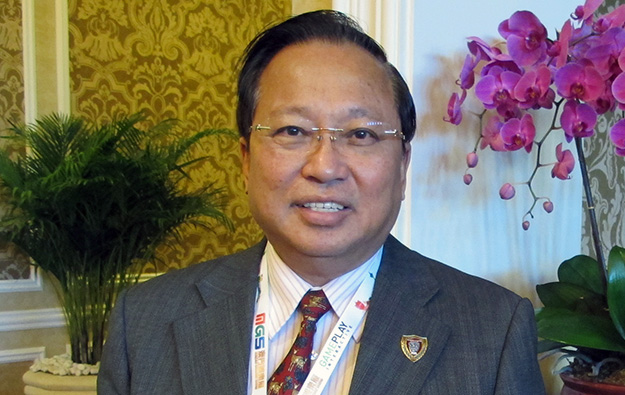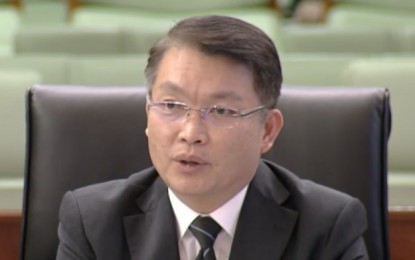Van Don, Phu Quoc casinos allowed Vietnamese: scholar
Nov 23, 2016 Newsdesk Latest News, Rest of Asia, Top of the deck

Two casino resorts under development in Vietnam – located respectively in the Van Don Special Economic Zone, it the north of country, and in Phu Quoc Island, in the south – will be allowed to accept bets from Vietnamese gamblers, according to Augustine Ha Ton Vinh, an academic who says he has been advising the government on liberalising Vietnam’s gaming industry.
“In late September, the Politburo [of the Communist Party of Vietnam] met and decided to open up the gaming industry, making it a national policy,” Mr Vinh (pictured) told GGRAsia.
He added: “They decided to allow local Vietnamese to gamble in two casinos – one in the north, in Van Don; and Phu Quoc in the south – on a trial basis for three years.”
Vietnam has a population of around 94 million. The country has several casinos, but authorities prohibit Vietnamese punters from gambling within the borders of the country, unless they hold a foreign passport. Allowing locals to play – even under restricted conditions – is likely to boost the interest of foreign investors in that nation’s casino gaming market, according to several analysts.
Mr Vinh’s comments to GGRAsia contradict reports by Vietnamese media in early September, that cited comments by reportedly senior – though unidentified – government officials, stating that the national authorities wanted to keep in place the country’s ban on locals entering casinos located inside Vietnam.
Mr Vinh was speaking on the sidelines of the Macao Gaming Show 2016, a regional casino industry trade show held from November 15 to 17 at the Venetian Macao. He is also a senior advisor for the Van Don Special Economic Zone.
The Van Don project is being developed by Vietnam’s Sun Group. It is located in a remote area around 160 kilometres (99.4 miles) east of Hanoi. Van Don’s development plan includes an airport to make it easy for players to come to the casino. Mr Vinh says the resort should open for business some time between 2017 and 2018.
The Phu Quoc casino is promoted also by a Vietnamese firm, called Vingroup. Unconfirmed media reports from Vietnam state the property could start operations before the end of this year.
In his comments to GGRAsia, Mr Vinh explained that the decision to allow locals to gamble at those two properties would be featured in a updated draft of a gaming decree that has been under consideration by the Vietnamese government since at least 2012.
He added that, to enter a casino, locals would have to pay a daily entry levy of US$50: a monthly pass would cost about US$1,100. Eligibility criteria for locals to enter casinos would include a minimum gambling age of 21 years and a minimum monthly income threshold, according to Mr Vinh.
The revised gaming draft decree could be published as soon as “the end of this year or some time in the spring,” Mr Vinh said.
He stated that, to attract further foreign investment into the country’s casino industry, the Vietnamese government had also halved the minimum required capital investment for each of the country’s integrated resort licences. The figure was initially set at US$4 billion.
Ho Tram out
When asked about why – from the information he had received – The Grand Ho Tram, an up and running gaming resort on the country’s southern coast, looked likely to be excluded from the trial programme for locals, Mr Vinh said that the Vietnamese government saw the property as better fit to serve tourists. “The government never had Ho Tram in its mind as a place for Vietnamese,” he stated.
Management at The Grand Ho Tram had told GGRAsia in an October 2014 interview that the property hoped to be part of a pilot programme for locals to gamble, possibly via the use of an entry levy for locals or some other economic test.
The Grand Ho Tram casino resort was designed by casino architect Paul Steelman, and opened in July 2013. The project is part of the Ho Tram Strip scheme, promoted by Asian Coast Development (Canada) Ltd. The firm was able to secure a 50-year lease on a 164-hectare (405-acre) beachside plot in Ba Ria-Vung Tau province, 120 kilometres southeast of Ho Chi Minh City, to implement the scheme.
In September, it was reported that Vietnam’s Ba Ria-Vung Tau province had agreed a location for Asian Coast Development to build an airport. The facility – to be located in Loc An Commune in Dat Do District – will have services from larger airports in Vietnam, in order to bring in tourists to The Grand Ho Tram.
There are currently several casino projects planned for Vietnam. One of those projects – located in Vietnam’s Quang Nam Province – involves Hong Kong-based Chow Tai Fook Enterprises Ltd, Macau junket operator Suncity Group and Vietnam-based asset management firm VinaCapital Group. In May, Suncity said in an emailed statement to GGRAsia that the project would include three hotels. The statement did not mention gaming.
Las Vegas Sands Corp is among several major foreign casino investors that have in the past reportedly looked at development opportunities in Vietnam. So reportedly has Bill Weidner, a former president of that company, who has since pursued investments of his own. MGM Resorts International once had a branding deal with the Ho Tram resort, but pulled out in March 2013, four months prior to the property’s opening.
Related articles
-
 Light & Wonder flags multi-year...
Light & Wonder flags multi-year...Nov 08, 2024
-
 Vietnam locals-play pilot confirmed to...
Vietnam locals-play pilot confirmed to...Nov 06, 2024
More news
-
 Macau to get 36mln visitors in 2025:...
Macau to get 36mln visitors in 2025:...Nov 21, 2024
-
 EBITDA a focus in Macau market share...
EBITDA a focus in Macau market share...Nov 21, 2024
Latest News
Nov 21, 2024
Macau’s 2025 visitor tally could reach 36 million, or a circa 9-percent gain on this year’s projected 33 million. So said Lei Wai Nong (pictured in a file photo), the city’s Secretary for...Sign up to our FREE Newsletter
 (Click here for more)
(Click here for more)
Pick of the Day
”[Baccarat side bets in Macau] are becoming more popular amongst players, based on what we observed when we conducted our [monthly premium mass] table surveys”
George Choi and Timothy Chau
Analysts at Citigroup
Most Popular
 Best whale since Macau monthly survey began in 2017: Citi November 18, 2024
Best whale since Macau monthly survey began in 2017: Citi November 18, 2024  Marina Bay Sands tapping US$9bln loan to expand: report November 19, 2024
Marina Bay Sands tapping US$9bln loan to expand: report November 19, 2024  US$30bln 2025 GGR target achievable for Macau: CE November 19, 2024
US$30bln 2025 GGR target achievable for Macau: CE November 19, 2024  RWS casino renewal 2yrs on ‘unsatisfactory’ tourism… November 19, 2024
RWS casino renewal 2yrs on ‘unsatisfactory’ tourism… November 19, 2024  Gaming technology firm IGT reports hacking incident November 21, 2024
Gaming technology firm IGT reports hacking incident November 21, 2024









